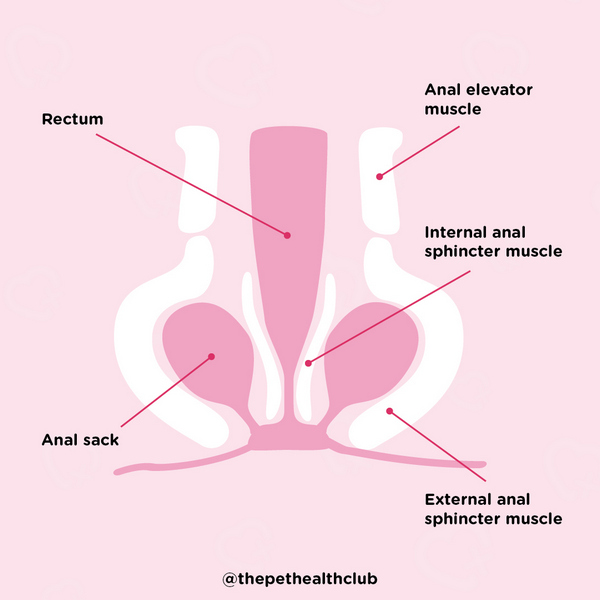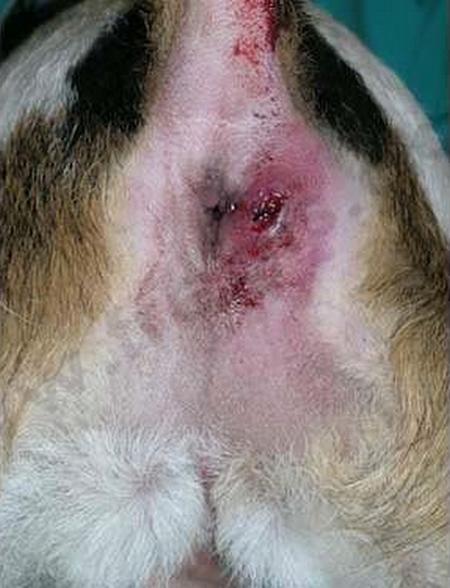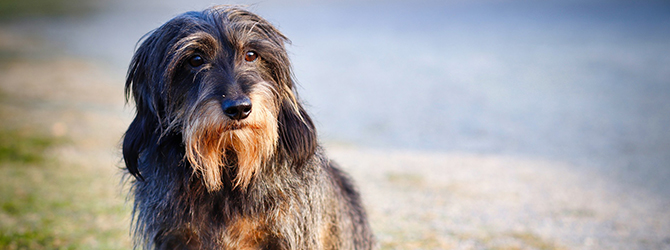Blocked anal glands in dogs
It’s not the most pleasant topic of conversation, but anal gland problems in dogs are a common reason for a vet visit.
These small fluid-containing sacs should release their smelly liquid every time a dog passes a solid poo, but if they become overly full, impacted or blocked, this can cause discomfort and even lead to infection.
Brief summary
- Anal glands in dogs are small, internal sacs that release a smelly liquid and can often get blocked
- Symptoms of anal gland blockages in dogs include scooting, excessive back-end licking, and a fishy smell
- Treatment can involve gland expression, medication, or surgery in severe cases
- Prevention includes a high-quality diet, healthy weight maintenance, and regular monitoring for early signs of blockage
What are anal glands?
Every dog has a pair of anal glands. They're small sacs, about the size of a blueberry, and sit just inside the anus (bottom). If you think of the circle of the anus as being a clock face, the anal glands are located around the 8 o’clock and 4 o’clock positions.
Dogs’ anal glands contain a strong-smelling liquid. If you’ve smelt it, you’ll know it — the odour is distinctively fishy and unpleasant. Small amounts of this liquid are released when a firm poo is pushed out of the anus, putting pressure on the anal glands. The glands should empty when the dog defecates and then re-fill in a constant cycle. This smelly discharge is important in canine scent communication.

Why do anal glands get blocked?
Any dog of any age, size, or breed can get blocked anal glands. However, there are a few reasons why some dogs are more prone to this condition.
- Some dogs are born with very narrow openings to the anal glands, which means they become more easily blocked.
- Gastrointestinal issues leading to soft stools, such as chronic diarrhoea, will mean the glands don’t empty fully (or at all), leaving them prone to becoming impacted, blocked or infected.
- Dogs who are overweight are more likely to have problems, as obesity is associated with weaker muscles around the back end.
- Older dogs are more likely to get blocked anal glands, although the condition can happen at any age. Certain breeds, including Cavalier King Charles Spaniels, Cocker Spaniels, Shih Tzus and Bichon Frises, may be more at risk.
Symptoms of blocked anal glands in dogs
Dogs with blocked glands usually find this very irritating and uncomfortable and may become quite distressed. So, how to tell if a dog's anal glands are full? Here are the main symptoms of blocked anal glands in dogs:
- Scooting their bottom along the floor
- Frantic licking and chewing at their back end
- Excessive grooming of the bottom, tail and legs
- Suddenly turning round to look at their back end
- Abruptly sitting down
- Seeming painful when pooing
When anal glands become very full, they can leak small amounts of fluid when your dog is sitting or lying down. This will appear as a small amount of dark brown fluid and will often have a very unpleasant smell, often described as ‘fishy’.
Treatment options for anal gland problems
If you think your dog may have blocked anal glands, seek veterinary advice. Blocked anal glands are sore and uncomfortable, and if left, can lead to impactions and infections and become much harder to treat.
Your vet will examine your dog’s glands by performing a rectal exam.
Expression
Most mild blockages are easily solved by a vet or veterinary nurse manually expressing the glands by feeling inside the dog’s bottom and squeezing the gland carefully with their fingers and thumb. This procedure can cause pain and further problems if done incorrectly, so always take advice from a veterinary professional.
Medication
Blocked anal glands can become sore, inflamed and even infected. Anal gland abscesses can form, causing pain and can make your dog unwell. Your vet may prescribe painkillers, anti-inflammatories or antibiotics.
Flushing
When anal glands become very full of material (impacted), they can be very difficult to express, especially if the material inside them gets thick and even solid. These cases may need their glands flushing out under sedation. A very small cannula is inserted into the gland, and saline is used to carefully flush out any unwanted material allowing the glands to restore their usual function.
Surgery
Some dogs have repeated problems with their anal sacs, despite all efforts at intervention. This is uncommon but may warrant the surgical removal of the glands. This procedure is not without risk and so is only considered as a last resort.
Preventing anal gland blockages
If your dog has experienced anal gland problems, you’ll know how much discomfort they can get into. Thankfully, there are some ways to help prevent this issue.
Diet

It’s important to feed your dog a good quality diet that is nutritionally complete and suitable for their age and activity level. Your dog should produce firm stools regularly. If their poos are sloppy, loose, irregular or otherwise abnormal, this may lead to the anal glands not emptying properly. Some dogs benefit from added fibre to help bulk their faeces out. Speak to your vet about an appropriate diet.
Weight
Keep dogs in a healthy condition to ensure optimal health.
Careful monitoring
Catching anal gland blockages early makes them much easier to deal with. If your dog is behaving oddly or showing signs such as scooting or licking, take it to the vet for a check of its glands.

FAQs
How often should dogs have their glands expressed?
There is some debate about whether regular expression of anal glands for dogs who have recurrent issues is helpful. If your dog has no signs of an anal gland blockage, it is generally recommended to leave them well alone and only express them when there is a problem. The sacs are fairly delicate, and being squeezed too often can lead to inflammation and even damage to the glands themselves.
How to get rid of dog anal gland smell?
If your dog has had anal gland problems, you may become uncomfortably familiar with the horrid smell! If your dog’s bottom is dirty, use warm water and a cloth or pet-safe wipes to clean it gently. If your floors or furnishings are affected, sprinkling bicarbonate of soda over affected areas is a safe and effective way of getting rid of unpleasant odours. Enzymatic cleaners are also useful.

Need advice on blocked anal glands in dogs?
For expert advice on anal sac problems in dogs or if your dog is showing symptoms of blocked anal glands, get in touch with your local vet.
Find your nearest vet using our find a vet page, or speak to one of our vets online using our video vets service.


